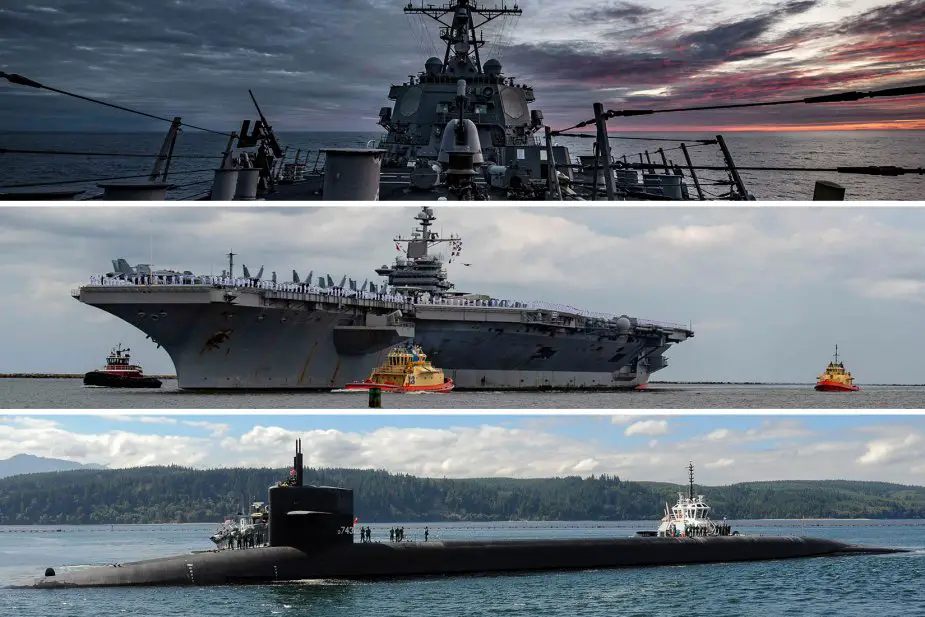Analysis: US Navy Shipbuilding Programs' Requirements For Sustainment Could Save Billions
The Navy has delivered warships—such as aircraft carriers, destroyers, and submarines—to its fleet over the past 10 years that require more effort to sustain than initially planned. In assessing how these classes of ships are sustained, GAO found 150 examples of class-wide problems, such as unreliable ship systems.
 US Navy Battle Forces (Picture source: Congressional Budget Office)
US Navy Battle Forces (Picture source: Congressional Budget Office)
These problems stemmed from shipbuilding programs not identifying, evaluating, or mitigating sustainment risks during the acquisition process. GAO found that it would cost the Navy $4.2 billion to correct just the 30 percent of these problems for which the Navy had data on estimated repair costs.
GAO found that shipbuilding programs' requirements for sustainment reflect weaknesses with how Department of Defense (DOD) policy defines these requirements for ships. Sustainment requirements should influence acquisition decisions that determine the sustainability of a ship class, such as the ship's design. However, the Navy's sustainment requirements do not provide key information on how reliable and maintainable mission-critical systems should be and, therefore, cannot adequately inform acquisition decisions.
GAO also found that shipbuilding programs did not consistently address sustainment risks in acquisition planning documents. For example, the operating and support costs included in cost estimates did not capture all sustainment risks that could affect costs or evaluate sensitivity to changing sustainment assumptions, contrary to DOD and Navy cost estimating guidance. As a result, for six shipbuilding programs whose costs GAO could assess, the Navy had underestimated sustainment costs by $130 billion, as shown below.
The Navy has begun making some changes to its acquisition oversight process, such as developing sustainment program baselines and adding a sustainment oversight review. While positive, these changes focus on considering sustainment after key decisions are made early in the acquisition process. GAO also found that DOD is not required to provide detailed information about shipbuilding programs' sustainment cost growth to Congress. As such, Congress does not have full insight into the extent of shipbuilding programs' cost growth and why such growth occurred.
Why GAO Did This Study
The U.S. Navy requested over $40 billion each of the last 3 years to build, operate, and sustain its fleet. Acquisition decisions made as ships are developed and built can have a long-term effect on sustainment costs and ship quality.
GAO was asked to assess the extent to which DOD considers and plans for sustainment when acquiring weapons. Among other objectives, this report assesses the extent to which: (1) Navy ship programs deliver ships to the fleet that can be sustained as planned; (2) the Navy develops and uses effective sustainment requirements during acquisition; (3) ship programs are effectively identifying and evaluating sustainment risks in planning documents; and (4) leadership considers programs' sustainment planning and outcomes.
GAO reviewed DOD and Navy acquisition policy and guidance, evaluated acquisition plans, collected sustainment metrics, and conducted interviews with more than 100 organizations, including program office and fleet units. GAO assessed 11 classes of shipbuilding programs (all nine that delivered warships during the last 10 years, as well as two newer classes of ships).
What GAO Recommends
GAO is making one matter for Congressional consideration to enhance oversight and 11 recommendations to help DOD and Navy improve ship sustainment. DOD concurred with 8 and partially concurred with 3 recommendations but did not describe specific actions, which GAO believes are necessary to improve sustainment outcomes.
Click here for the full report (106 PDF pages), on the GAO website.


























